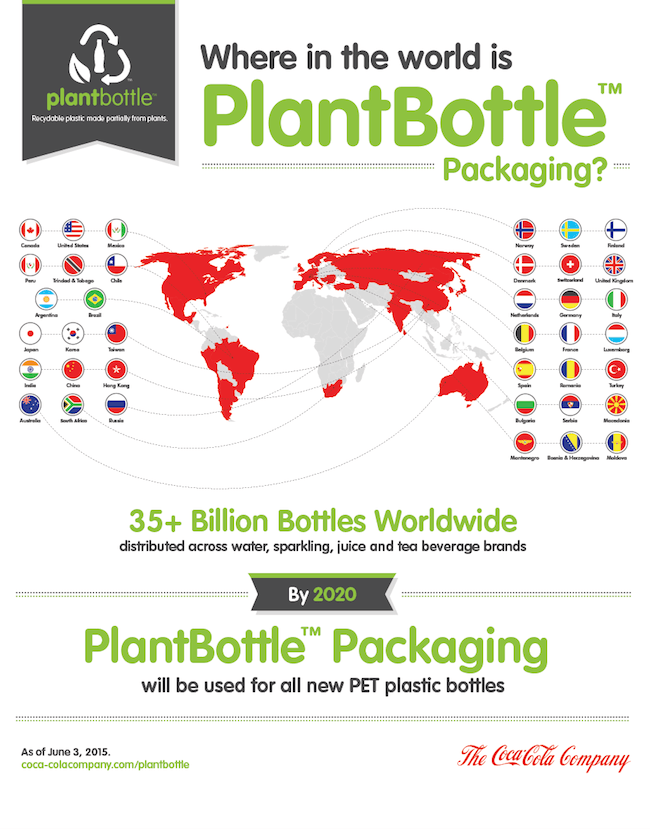
While the COP21 Paris climate talks have been lumbering through the expected obstacles set up by national political leaders, elsewhere things have been hopping with action. Earlier this week, a global coalition of 44 state and regional officials pressed for strong action, as did a group of more than 200 U.S. mayors and other local officials.
In the latest development, 114 companies, including household names such as Dell, Sony, Ikea Group, Coca-Cola Enterprises, Walmart, General Mills and Kellogg, have gone above and beyond the COP21 climate goals to join the Science Based Targets initiative.
COP21 is missing the target
COP21 seems on track to avoid the disastrous conclusion of the 2009 Copenhagen climate talks, but according to some observers, even if COP21 ends on a strong note, the voluntary carbon commitments made by national governments will not be enough to avert catastrophic climate change.
Soft drinks and breakfast cereals to the rescue
Like the name says, the Science Based Targets initiative is designed to promote effective targets based on climate science, not on political will. It is a partnership between an A-list of global organizations that includes CDP, the World Resources Institute, WWF and the U.N. Global Compact.
The first group of 10 is an interesting mix because it demonstrates the impact that everyday products -- such as soft drinks and breakfast cereals -- have on global carbon emissions. That's clearly illustrated by the above infographic from Coca-Cola, which illustrates the reach of the company's bio-based PlantBottle initiative.
The standards are strict, and companies have to work hard to meet the targets. Triple Pundit readers will probably recognize most of the first 10 companies to have their targets approved: Coca-Cola, Dell, Enel, General Mills, Kellogg, NRG Energy, Procter & Gamble, Sony and Thalys.
If Thalys doesn't ring a bell, that's the European rail service. Enel Green is a global company based in Italy, and NRG is a U.S. energy company that has been transitioning from conventional power generation to community solar and other alternatives.
Strong targets, strong action
With just 10 of the 114 pledgees under approval, the Science Based Targets initiative will score an impressive result. The 10 companies combined are expected to reduce emissions from their direct operations by 799 million tons of carbon dioxide, which works out to avoiding the combustion of 1.86 billion barrels of oil.
Once all of the 114 companies are on board, the impact on global emissions is expected to be significant. Their combined profits in 2014 added up to more than $932 billion, which is more than the gross domestic product of Indonesia.
In addition, the companies have also pledged to tighten up their supply chains to reduce emissions. Coca-Cola's PlantBottle initiative, for example, is a benchmark-setting example of supply chain innovation, and it is touching off collaborations with other companies including Heinz and Ford.
Here's the rundown on Kellogg's commitment by chairman and CEO John Bryant:
" ... Kellogg is setting a new target for the reduction of greenhouse gas emissions. We plan to cut GHG emissions by 65 percent across our operations, known as Scope 1 and 2, and, for the first time work with suppliers, known as Scope 3, to help reduce their emissions by 50 percent by 2050."We recognize the interconnected and inter-reliant nature of our business with suppliers, farmers, customers, consumers and governments. These types of commitments require cooperation across the full supply chain. That is the only way we can truly be successful."
The initiative also spotlights the efforts of companies that produce carbon-dependent products. Automobiles are one of two obvious examples, the other being electronic goods. In that field, the U.S. company Dell has taken on a leadership role. As part of its Science Based Targets pledge, Dell committed to reduce the energy intensity of its products by 80 percent by 2020. That's in addition to a 2020 goal of reducing its facility and operational emissions by 50 percent compared to 2011.
Honda is among the 104 pledgees that are still working on their plans, and as a vehicle manufacturer it certainly has a tough row to hoe. However, in 2012 Honda became the first auto manufacturer to catalog and disclose its greenhouse gas emissions, which gives it a running start on a leadership position.
With a variety of forward-looking initiatives such as vehicle-to-grid technology and fuel cell electric vehicles under its belt, Honda also has a head start on setting and meeting ambitious targets.
Two other auto companies, Nissan and Renault, are also among the 104 pledgees waiting on approval.
Regardless of the COP21 outcome, the Science Based Targets initiative is yet another demonstration that solid action on carbon management is a good deal for the bottom line. The 114 companies that have joined are among the most successful and innovative in the world -- and, by the way, it's not too late to join the pledge.
Image via Coca-Cola Enterprises

Tina writes frequently for TriplePundit and other websites, with a focus on military, government and corporate sustainability, clean tech research and emerging energy technologies. She is a former Deputy Director of Public Affairs of the New York City Department of Environmental Protection, and author of books and articles on recycling and other conservation themes.














